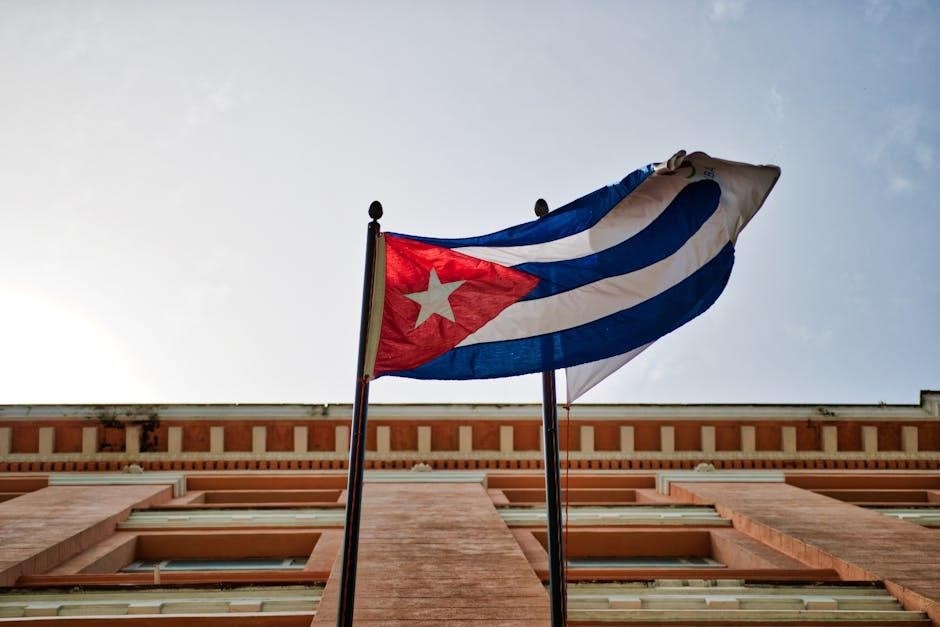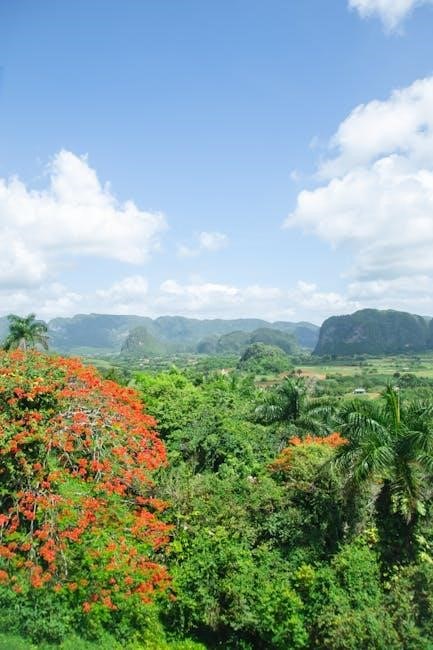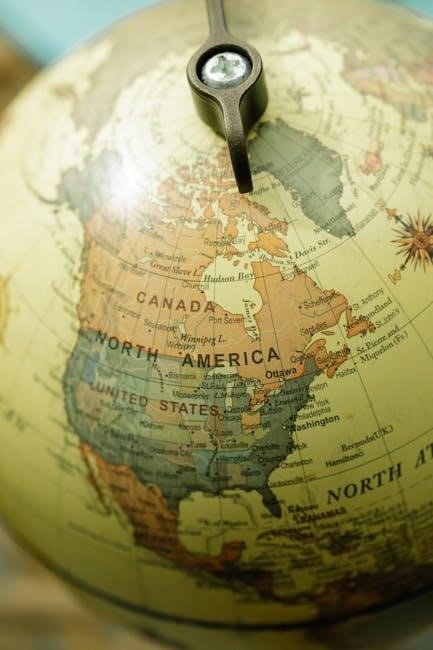Cuban customs regulations outline duty-free allowances, weight limits, and value thresholds for imported goods. Travelers can bring personal effects up to 25 kg tax-free, with additional items subject to progressive tariffs based on their value and weight.
Overview of Customs Rules and Allowances
Cuban customs regulations are designed to facilitate travel while ensuring compliance with import/export laws. Travelers are permitted to bring personal effects up to 25 kg tax-free, with additional items subject to progressive tariffs based on their value and weight. The total value of imported goods must not exceed 1000 points (equivalent to $2000 USD), with the first 50 points ($50 USD) being tax-exempt. Items exceeding this threshold are subject to duties proportional to their value. Weight limits also apply, with a maximum of 100 kg for non-personal items. Postal shipments and courier services allow imports up to $2000 in value and 50 kg in weight. These rules aim to balance individual needs with national customs policies, ensuring a smooth process for travelers while preventing commercial imports under personal allowances.

Personal Allowances and Exemptions
Travelers to Cuba can bring up to 25 kg of personal effects tax-free, with an additional 1000-point limit (equivalent to $2000) for other items. Postal shipments allow up to $2000 in value and 50 kg in weight.
Weight Limits for Duty-Free Items
Travelers to Cuba are allowed a duty-free weight limit of 25 kg for personal effects, which includes clothing, toiletries, and essential items. Additionally, up to 5 kg of goods for family or friends can be brought without incurring customs charges. The total weight of duty-free items cannot exceed 30 kg when combining checked luggage and carry-on bags. For non-personal items, the weight limit is 100 kg, but any excess is subject to customs duties. Postal shipments and courier services allow up to 50 kg per package, with a maximum value of $2000. It’s important to note that exceeding these weight limits may result in additional taxes or tariffs. The Cuban customs authority enforces these regulations strictly to ensure compliance with import rules. Always check the most recent updates before your trip to avoid any issues at the border. Proper documentation and adherence to these weight limits will facilitate a smoother customs process.
Value Thresholds for Tax-Exempt Goods
Cuban customs regulations establish specific value thresholds for tax-exempt goods. Travelers are allowed to import goods up to a value of 1,000 points (equivalent to $2,000) without commercial purposes. The first 50 points (approximately $50) are entirely tax-exempt. For imports exceeding this threshold but not surpassing 1,000 points, a progressive tariff system applies, calculated based on the item’s value. Postal shipments and courier services allow imports up to $2,000 in value, with no additional taxes for the first $50. It’s important to note that the total value of imported goods must not exceed $2,000 to qualify for tax exemptions. Any value beyond this limit will incur customs duties. The Cuban authorities use a reference value system to assess the taxable amount of imported goods. Ensuring compliance with these value thresholds is crucial to avoid additional charges or delays during customs clearance. Always verify the most recent updates to these regulations before your trip to Cuba.
Permitted Quantities of Specific Items
Cuban customs permit specific quantities of items, such as up to 5 hardware items per type, provided their value does not exceed $50. Electronics and personal effects are allowed within the 25 kg tax-free limit. Excess quantities may incur tariffs.
Electronics and Personal Effects
Travelers to Cuba are permitted to bring electronic devices and personal effects within specified limits. Electronics, such as smartphones, laptops, and tablets, are generally allowed for personal use, provided they do not exceed the duty-free thresholds. Personal effects, including clothing, toiletries, and small personal items, are typically exempt from duties up to a weight limit of 25 kg. This allowance is designed for non-commercial purposes, ensuring that items are for personal use during the trip or as gifts. However, declaring these items accurately is essential to avoid complications. Exceeding the permitted quantities or bringing items for resale may result in tariffs or confiscation. The Cuban customs authority emphasizes the importance of adhering to these regulations to facilitate smooth processing at entry points. By staying within the allowed limits, travelers can ensure a hassle-free experience when bringing their electronics and personal effects into the country. Proper documentation and compliance with these guidelines are key to a seamless customs process.
Food and Hygiene Products
Travelers to Cuba are permitted to import food and hygiene products for personal or non-commercial use, with specific limits to ensure compliance with customs regulations. According to current guidelines, these items can be brought in up to a value of 500 USD or a weight of 50 kg, whichever is applicable. This allowance is designed to cover essential goods for personal consumption or hygiene needs during the trip. It is crucial to declare all food and hygiene products upon arrival to avoid potential penalties or confiscation. Items exceeding these limits may be subject to tariffs or restricted entry. The Cuban customs authority emphasizes that these regulations are in place to prevent commercial imports under the guise of personal use. By adhering to these limits, travelers can ensure a smooth customs process and avoid unnecessary complications. Proper declaration and compliance with these guidelines are essential for a hassle-free experience when importing food and hygiene products into Cuba.

Declaration Process and Documentation
Travelers must declare all items upon arrival in Cuba. Required documents include a detailed list of goods, their values, and proof of purchase. A customs declaration form must be completed accurately to avoid delays or penalties.

Required Documents for Customs Clearance

When entering Cuba, travelers must present specific documents to ensure smooth customs clearance. A detailed list of all items, including their values and quantities, is essential. Proof of purchase for high-value goods, such as electronics or jewelry, may be requested. A completed customs declaration form, provided by airport staff or available online, must be submitted upon arrival. Passports and visas are mandatory for identification. For shipments or commercial imports, a commercial invoice and bill of lading are required. Additionally, a “Simulador de equipajes” (baggage simulator) can help calculate permitted quantities based on current regulations. Failure to provide accurate documentation may result in delays, fines, or confiscation of items. It is crucial to ensure all documents are up-to-date and comply with Cuban customs regulations to avoid complications during the clearance process.
Consequences of Non-Compliance
Failure to comply with Cuban customs regulations can result in severe penalties. Travelers who exceed permitted quantities or undervalue items may face confiscation of goods, fines, and additional tariffs. Confiscation is applied to items exceeding the allowed limits, while fines are calculated based on the value and nature of the goods. Progressive tariffs apply to imports exceeding the 50 USD threshold, increasing costs significantly. Delays in customs clearance are common for non-compliant travelers, potentially disrupting travel plans. Legal action may be taken in cases of intentional evasion or smuggling. It is essential to adhere strictly to customs rules to avoid these consequences and ensure a smooth entry into Cuba.
